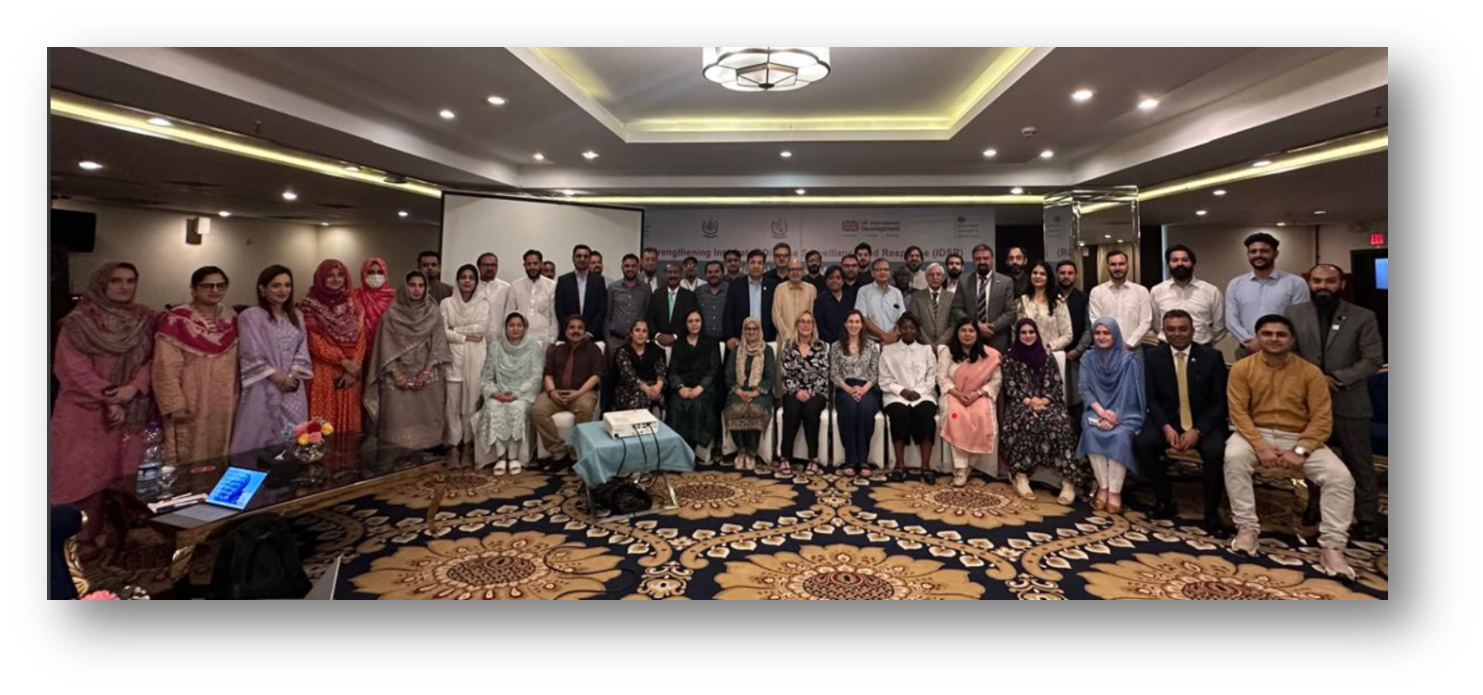
Public health experts from across Pakistan convened in July for the annual review of its Integrated Disease Surveillance and Response (IDSR) network. The UK Health Security Agency (UKHSA) International Health Regulations Strengthening Project (IHR-SP), in partnership with Pakistan’s National Institute of Health (NIH), the Ministry of National Health Services, Regulations and Coordination (MoNHSR&C) and provincial governments mobilised key partners to evaluate national and sub-national progress, identify surveillance and response gaps, review data trends, and update strategies to enhance the effectiveness of IDSR implementation across Pakistan.
The meeting brought together over 45 public health experts from national and provincial health departments, as well as international partners including the World Health Organization (WHO), US Centers for Disease Control and Prevention (CDC), Jon Snow Inc. (JSI), Fleming Fund, JHPIEGO, Eastern Mediterranean Public Health Network (EMPHNET), The Global Fund. The UK Department of Health and Social Care (DHSC) and UKHSA IHR-SP Senior Leadership also attended, reaffirming the UK’s commitment to Pakistan’s IDSR roadmap and shared accountability to global health security.
In his opening remarks, Dr. Mumtaz Ali Khan, NIH Chief for Centre for Disease Control (CDC), acknowledged UKHSA’s critical technical support and emphasised the importance of aligning IDSR efforts with global health security goals and IHR compliance.
Key Sessions and Insights
The workshop delivered a detailed picture of Pakistan’s evolving IDSR landscape, with UKHSA IHR-SP Pakistan’s Epidemiology Surveillance Lead Zeeshan Baig moderating the meeting and providing comprehensive updates on national IDSR progress aligned with WHO International Health Regulations.
The meeting showcased progress in digital tools and cross-sector coordination as making continued improvements to surveillance capabilities. The integration of event-based and indicator-based surveillance has also created a more responsive early warning network, with the introduction of community-based surveillance emerging as a key milestone that aligns closely with Pakistan’s IDSR Roadmap 2025.
Provinces and federating units also shared progress, celebrating improvements in data quality whilst acknowledging persistent challenges including workforce shortages and reporting delays.
WHO representatives presented the development of standard operating procedures (SOPs) for IDSR, aimed at standardising surveillance practices and ensuring timely detection and response.
The workshop’s concluding panel allowed experts to explore systemic gaps, data interoperability, and opportunities to strengthen IDSR governance, workforce capacity, and coordination across all administrative levels.
The recommendations emerging from these discussions include expanding IDSR into tertiary healthcare facilities, building a comprehensive public health laboratory network, strengthening community-based detection systems, implementing the 7-1-7 approach, and aligning national priorities with global health security commitments.
Dr Zeeshan Baig, UKHSA IHR-SP Pakistan Surveillance lead said: “I sincerely thank all participants for their active engagement and collaborative spirit, your contributions are vital in strengthening our collective surveillance and response capacity.”
Looking Ahead: A Shared Vision for Resilience
Looking forward, the collective commitment of NIH, MoNHSR&C, provincial health departments, UKHSA, and all partners reflects a strong national and international drive toward institutionalising IDSR, and building a resilient, data-driven surveillance system capable of timely public health action and effective response to emerging threats.
Also By
- First-of-its-kind Community-Based Surveillance Training in Mardan to Boost Pakistan’s Disease Preparedness and response
- Emergency disease surveillance system in action for recurrent floods in Pakistan
- Expanding Sindh’s Integrated Disease Surveillance and Response Network (IDSR) Laboratory Network to private laboratories
Useful Resources
Related Articles
-
From vision to action: Sindh’s IDSR Lab Network Review marks key progress in Pakistan’s IDSR journey
BY Dr Muhammad Sartaj -
Gilgit-Baltistan launches new laboratory network in efforts to strengthen Integrated Disease Surveillance and Response across Pakistan
BY Dr Muhammad Sartaj, Sumera Abid -
Building a stronger health partnership with academic institutions for strengthening IHR in Pakistan: IDSR training for Master Trainers at The Institute of Public Health, Lahore
BY Dr Muhammad Sartaj -
Pioneering training on “District Health Information System-2” to strengthen Integrated Disease Surveillance and Response System in laboratories in Sindh province of Pakistan
BY IHR -
Expanding Sindh’s Integrated Disease Surveillance and Response Network (IDSR) Laboratory Network to private laboratories
BY Sumera Abid, Dr Muhammad Sartaj

Please Sign in (or Register) to view further.